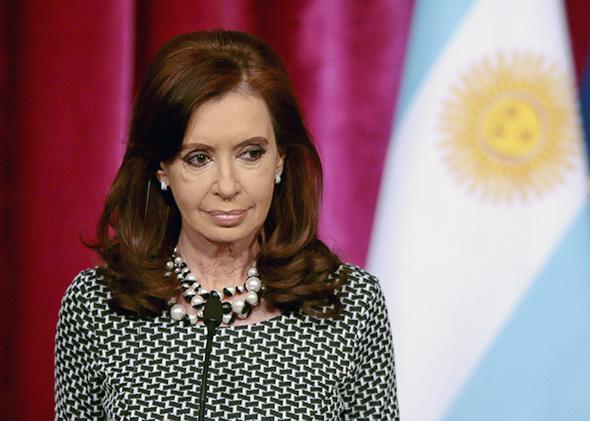Argentina seems poised for another crisis. It has been years in the making.
The catalyst is the mysterious death on Jan. 18 of Alberto Nisman, a federal prosecutor charged with investigating the 1994 bombing of the Jewish community center, or AMIA, in Buenos Aires, which left 85 people dead and 300 more injured. Since the revelation of Nisman’s death, conspiracy theories have run wild, fueled by social media and bitter animosity between the government and much of the mainstream press. They reached a fever pitch last week with the discovery of a draft warrant for President Cristina Fernández de Kirchner’s arrest in Nisman’s trash.
Four days before his death, Nisman had submitted criminal accusations against the government of President Fernández. Nisman was supposed to testify the next day to a congressional committee about his findings. He planned to deliver evidence linking the Argentine government to the Iranian regime in a pact to cover up Tehran’s role in the bombing. In that alleged pact, Argentina was to get a food-for-oil agreement to help pull Argentina out of its economic tailspin.
You know there’s trouble when a country has to sign deals with rogue states to prevent economic Armageddon. You know there’s serious trouble when a government parlays its investigation into a lucrative plan to botch it up.
The saga ravels together two longstanding problems. The first is the vulnerability of Argentine institutions to manipulation and the weakness of the rule of law. After the AMIA bomb went off, then-President Carlos Menem promised justice. What followed was a sham. Corrupt police officers were arrested. Extraditions were deliberately bungled. One Iranian spy, Abolghasem Mesbahi, reported that Menem received $10 million in his Swiss bank account from Tehran to thwart investigators. The federal judge overseeing the case, Juan José Galeano, was finally impeached more than 10 years later. One of the leading voices in the campaign for greater transparency in the investigations was Cardinal Jorge Mario Bergoglio, now Pope Francis. In 2006, Nisman accused Tehran of abetting the Lebanese militants, Hezbollah, in the bombing.
To cap things off, in 2013 the Argentine government signed an agreement with Iran to form a “Truth Commission” to investigate the AMIA bombing. A year later, an Argentine court ruled the agreement to be unconstitutional. A stacked Congress is appealing the decision.
The Nisman affair is a saga that braids together incompetence, corruption, and murder on a global scale.
The other dark shadow cast over this controversy is the history of Argentina’s intelligence services. Their origins date to the first Juan Perón government (1946–55), which enlisted Nazi war criminals to serve as Perón’s spies. During the military junta’s rule in the late 1970s and early 1980s, the services were deeply involved in repressing the opposition and colluding with neighboring dictatorships. After the return to democracy in 1983, many argued that the intelligence services needed to be cleansed or disbanded. They weren’t. In the course of the AMIA investigations, the Secretariat of Intelligence became part of the problem. One former investigator, Claudio Lifschitz, claimed he was abducted and tortured by SI agents. The intelligence services have been hoarding incriminating evidence on all sides, using it to empower a secret state within the state.
As with so many rackets, internal feuding broke out inside the SI. Some factions patronized President Fernández; others freelanced. Last December, President Fernández launched a purge. This tipped the scales. One of the ousted SI agents was the chief of operations, the murky Antonio Stiusso. Stiusso had been feeding Nisman transcripts of wiretapped conversations between top Fernández aides and senior Iranian officials about squelching the AMIA inquiry and food-for-oil bargaining. Some in the president’s circle said Stiusso was conniving with American sources in a campaign to isolate Iran.
While the saga is worthy of more than cloak-and-dagger thriller (depending on your preferred conspiracy theory), it goes to the heart of Argentina’s ailments. Despite the restoration of democracy in 1983, trust in Argentine public institutions makes Americans’ faith in Congress look like puppy love.
In the mid-’80s, there was hope that Argentina could reinvent itself after decades of turmoil. Instead, the economy staggered through several depressions. Faith in government plunged. Public services remain atrocious. The judiciary is notoriously inefficient. No one trusts official data about inflation. The government pegs inflation at around 16 percent; private sources say it tops 40 percent. Most economists warn that it is rapidly rising. With $10 billion in foreign debt maturing this year, the government is feuding with holdout creditors. This is not a good time to have a political meltdown.
President Fernández does little to restore confidence when the country sorely needs it. Her personal response to Nisman’s death brings distrust to new lows. At first, she pounced on the news with a rambling self-serving excursus on his “suicide.” Then she claimed that the prosecutor had been murdered as part of a plot to bring her down. On Jan. 26, she dissolved the intelligence services. All but her die-hard supporters think she will rebuild the secret service to her liking and that of her Peronist Party before she steps down at the end of this year. If she gets her way, few count on any meaningful investigation into allegations of corruption and wrongdoing.
At this stage, it is hard to know what is worse: the rot in Argentine public institutions that can’t investigate an atrocity after 20 years, the depths to which Argentine hopes for truth and accountability have plunged, or the sordid spectacle of a president personalizing a crisis she helped to create?
After more than three decades of democracy, the truth in Argentina is still as elusive as ever.
